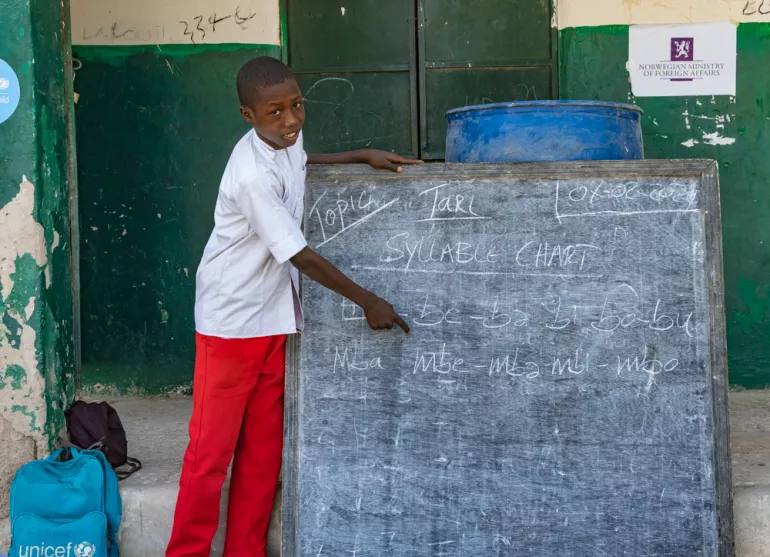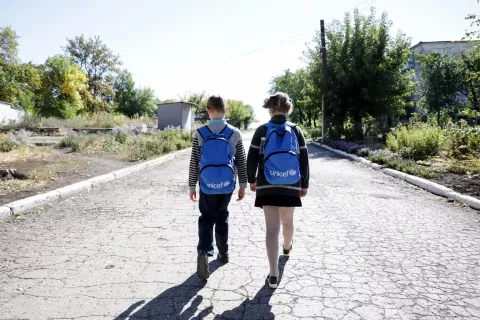Ezekial Jacobs, a 33-year-old school teacher from Nigeria is no stranger to crisis.
Civil armed conflict and violence has gripped Ezekial’s home in the North-East region since 2009, forcing more than 1 million children out of school, damaging over 400 schools and resulting in the deaths of over 2,295 teachers. With the region gradually recovering from the devastation wrought by over a decade of conflict, Ezekial and many of his fellow teachers are ready to move forward and rebuild their communities by tackling a different kind of crisis — the learning crisis.
Hundreds of millions of students are going to school but not learning the basics of reading and mathematics.
The world is grappling with a learning crisis. Globally, nearly two-thirds of children are suffering from ‘learning poverty’ – meaning they cannot read and understand a simple story by age 10. And in Sub-Saharan Africa – the epicenter of the learning crisis – this rate is nearly nine out of every 10 children.
Foundational learning — learning basic reading, numeracy and socio-emotional skills — gives children the essential building blocks to comprehend information, empathize with others, communicate effectively and solve problems. These skills are the foundation for developing all other critical skills including digital, entrepreneurial and job-specific skills. Without foundational skills, students often struggle to thrive later in school and as they enter the workforce. Declining literacy levels among young children not only impacts the student but also poses a serious threat to development and economic growth at both the national and global level.
One of the key factors contributing to the learning crisis is the global shortage of teachers, affecting both high- and low-income countries alike. Globally, 44 million additional primary and secondary teachers are needed if we are to meet Sustainable Development Goal (SDG) 4 by 2030. In Sub-Saharan Africa, the region most impacted by teacher shortages, there is an average of 58 students for every one trained teacher compared to the global average of 24 to one. The consequences of teacher shortages can be devastating, not only on the quality of learning but on teacher workload and well-being.
Most teachers are not equipped to tackle the learning crisis
The alarming state of learning can also be attributed to the quality of teachers.
Nearly 45 per cent of countries have no teacher training on foundational literacy and numeracy and fewer than half of all countries surveyed in UNICEF’s RAPID 2023 analysis have a specific focus on foundational literacy, numeracy and socio-emotional learning in their national curriculum.
When designing interventions to support teachers at the forefront of the learning crisis deciding where to start can seem daunting. The good news is, there is evidence on what works and there are solutions to tackle the crisis.
There is a solid body of evidence and the path forward is clear: foundational learning must come first.
Fixing foundations first: lessons from North-East Nigeria
Based on a growing global body of evidence, as well as a comprehensive local assessment and consultation, the Government of Nigeria established that the first step in addressing the big foundational learning gaps among its students was to invest in its teachers. When awarded a US$ 20 million Global Partnership for Education (GPE) Accelerated Funding (AF) grant aimed at improving student learning outcomes in the North-East region, the Government of Nigeria prioritized professionalization and upskilling of its teaching force.

In May of 2022, Ezekial was just one of over 28,000 teachers to graduate from the UNICEF-supported training programme, allowing him to pass qualifying exams and officially become licensed to teach after nearly a decade in the classroom.
“I have been teaching for nine years without the minimum level of qualification required. I was stuck on that level for years and it remained a source of worry for me.”
The accelerated one-year training programme also aimed to equip teachers with tailored skills and knowledge to meet the foundational needs of all students in their distinct classrooms — classrooms that on average have only one teacher for every 124 students. Ezekiel shared that his teaching approach has been greatly impacted by the skills he gained, and he now feels more confident that he can make a dent in the learning crisis, one student at a time.
“Now I am able to understand learners and support them. For instance, I now recognized that not every child in a classroom will learn at the same pace. A class will normally have fast learners, slow learners and average learners. I have been equipped with the knowledge and capacity to teach all children with the right materials.”
Although highly localized, the teacher training programme in North-East Nigeria offers some key lessons and insights for developing sustainable foundational learning-focused programming.
These programmes should be evidence-based, drawing from global evidence, best practices, and targeted local assessments and consultations. They should also be transformative, exploring approaches beyond standard teacher training models and create new pathways for recruiting and qualifying teachers. Moreover, these programmes should be systemic and sustainable, developed in collaboration with government counterparts and integrated into existing teacher training and accreditation systems. Finally, they should be smart, assessing the cost-effectiveness of various evidence-based interventions to ensure strategic allocation of limited resources.
Now more than ever, investing in teachers is key to tackling the learning crisis and ensuring classrooms around the world gain more teachers – teachers like Ezekiel – that are trained, qualified and supported to help every child learn the foundations so they can reach their full potential.





